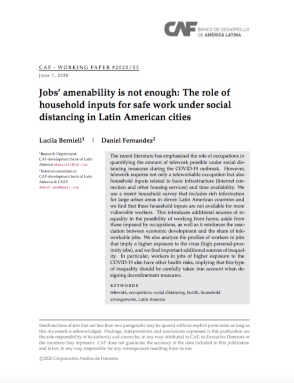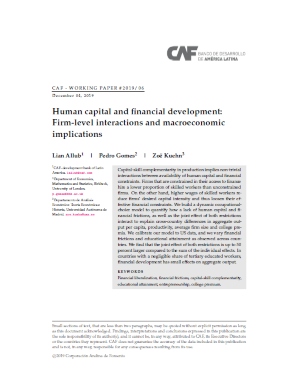Jobs’ amenability is not enough: The role of household inputs for safe work under social distancing in Latin American cities
Resumen
The recent literature has emphasized the role of occupations in quantifying the amount of telework possible under social distancing measures during the COVID-19 outbreak. However, telework requires not only a teleworkable occupation but also household inputs related to basic infrastructure (Internet connection and other housing services) and time availability. We use a recent household survey that includes rich information for large urban areas in eleven Latin American countries and we find that these household inputs are not available for more vulnerable workers. This introduces additional sources of in- equality in the possibility of working from home, aside from those imposed by occupations, as well as it reinforces the association between economic development and the share of tele- workable jobs. We also analyze the profiles of workers in jobs that imply a higher exposure to the virus (high personal-proximity jobs), and we find important additional sources of inequality. In particular, workers in jobs of higher exposure to the COVID-19 also have other health risks, implying that this type of inequality should be carefully taken into account when designing deconfinement measures.
Título paralelo
CAF - WORKING PAPER #2020/03
Materia
País / Región
Fecha
2020-06-01Citar de esta publicación
Item perteneciente a la Colección

Items Relacionados
Heterogeneous effects of automation: How are young workers affected by a changing labor market?
We study the effect of automation on labor market outcomes with a focus on young workers and the case of Chile. We develop an index of routine task ...
Financial Frictions, Occupational Choice and Economic Inequality
We develop a quantitative theory of entrepreneurship, income inequality, and financial frictions disciplined with household data from Brazil. The theory ...
Human Capital and Financial Development: Firm-Level Interactions and Macroeconomic Implications
Capital-skill complementarity in production implies non-trivial interactions between availability of human capital and financial constraints. Firms that ...




